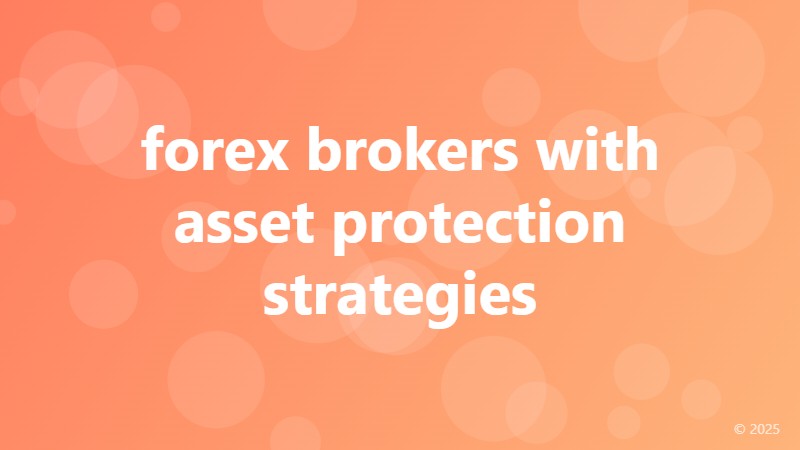forex brokers with asset protection strategies

Why Asset Protection Strategies Matter in Forex Trading
When it comes to Forex trading, risk management is crucial to protect your investments from unforeseen market fluctuations. One effective way to mitigate risks is by working with Forex brokers with asset protection strategies. These brokers offer a range of safeguards to ensure that your assets are secure, even in the most volatile market conditions.
Types of Asset Protection Strategies Offered by Forex Brokers
Forex brokers with asset protection strategies employ various techniques to safeguard their clients' assets. Some common strategies include:
Segregated Accounts: Reputable Forex brokers maintain segregated accounts, separating client funds from their own operational funds. This ensures that client assets are not used for the broker's business activities.
Negative Balance Protection: This strategy prevents traders from incurring losses exceeding their account balance. It ensures that clients are not liable for any deficits exceeding their initial investment.
Stop-Loss Orders: Forex brokers with asset protection strategies often offer stop-loss orders, which automatically close a trade when it reaches a predetermined price level, limiting potential losses.
Insurance Coverage: Some brokers provide insurance coverage for client assets, offering an additional layer of protection in the event of unforeseen events.
Benefits of Working with Forex Brokers with Asset Protection Strategies
By partnering with Forex brokers that offer robust asset protection strategies, traders can enjoy several benefits, including:
Enhanced Security: Forex brokers with asset protection strategies provide an additional layer of security, giving traders peace of mind and confidence in their investments.
Reduced Risk: By employing various risk management techniques, Forex brokers can reduce the likelihood of significant losses, ensuring that traders' assets are protected.
Increased Transparency: Reputable Forex brokers with asset protection strategies maintain transparent business practices, providing traders with a clear understanding of their risk management policies.
How to Choose a Forex Broker with Asset Protection Strategies
When selecting a Forex broker with asset protection strategies, consider the following factors:
Regulation: Ensure the broker is regulated by a reputable authority, such as the Financial Conduct Authority (FCA) or the Commodity Futures Trading Commission (CFTC).
Reputation: Research the broker's reputation online, reading reviews and testimonials from existing clients.
Risk Management Policies: Carefully review the broker's risk management policies, ensuring they align with your trading goals and risk tolerance.
By working with a Forex broker that prioritizes asset protection, traders can focus on their trading strategies, confident that their investments are secure and protected from unnecessary risks.